TAPI Pipeline Analysis – Part 2 Afghanistan: Herat and Farah Province
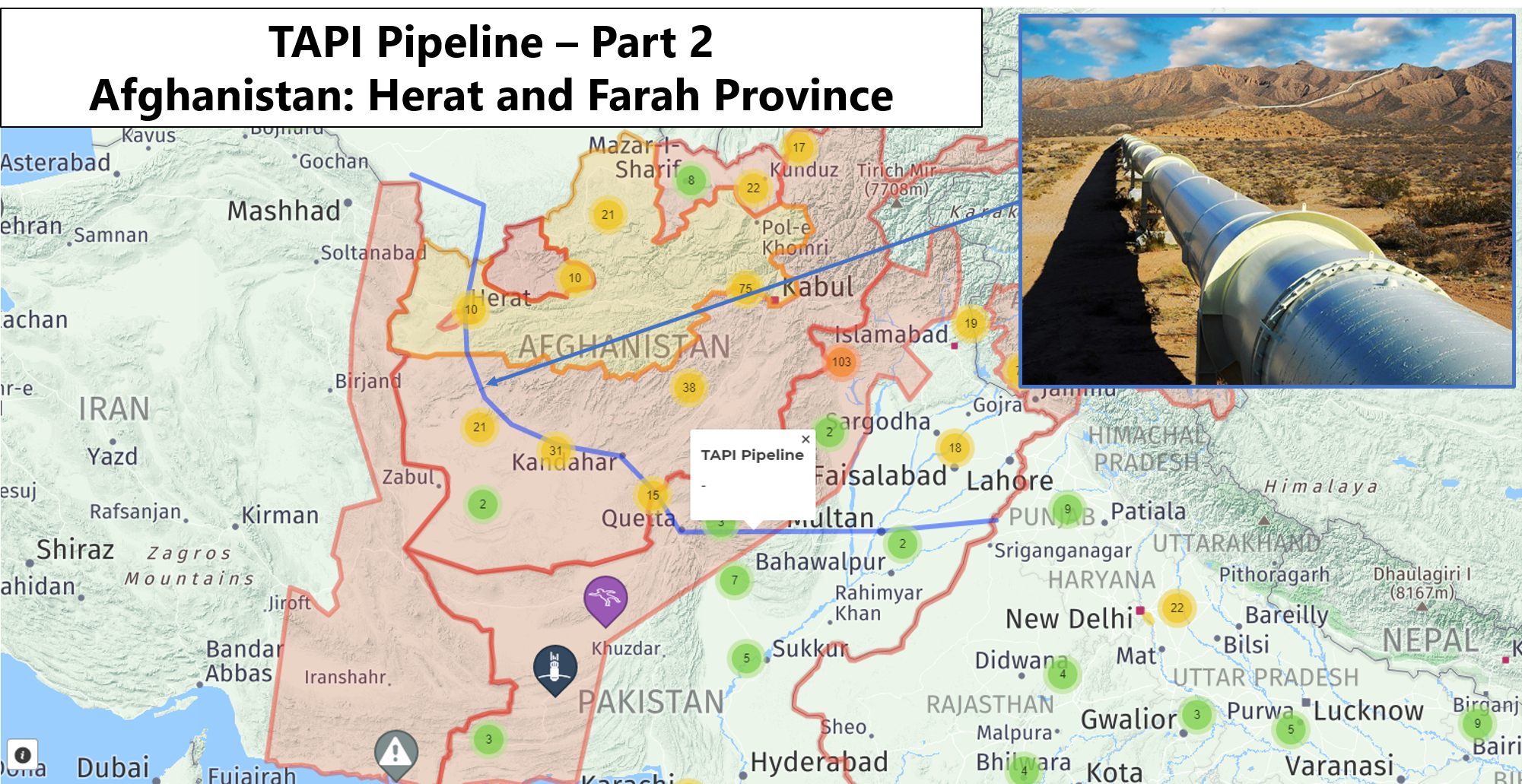

Afghanistan
Afghanistan represents a major security challenge to the TAPI Pipeline project, yet work related to the pipeline has continued regardless. Preparatory functions such as de-mining and social analytical work are taking place at the time this piece is written and in the face of prevalent security threats. Promises made by the Afghan National Unity Government (NUG) such as an increase in security forces have attempted to put foreign and domestic investors minds at ease, however, without visible changes in the security situation in Afghanistan it is unlikely that these promises will go far. In response to the insecurity in Afghanistan, the British Foreign Commonwealth Office states bluntly that âRoad travel is highly dangerousâ and that âIf youâre travelling around Afghanistan, including Kabul, you should seek professional security advice and continually reassess your personal security.â[i] The FCOâs concerns are well founded, and this section will aim to highlight the nature of the threats in the country, and how they may impact the TAPI Pipeline. The security situation in Afghanistan is dominated by the Taliban insurgency, and how significant a threat the Taliban are to TAPI will therefore be addressed in this section.
Promises of Protection Made by the Talibanâs
The Taliban have claimed that they will protect national infrastructure projects, and as part of this promise singled out the TAPI Pipeline[ii] as a project which they are willing to protect. The Taliban made a similar agreement with the US company UNOCAL in 1997 when the pipeline was in its conception stage. This promise has the ability to put the vast majority of Afghan security related concerns at ease, however, whether or not this is a realistic promise is worth further discussion.
The Taliban, despite their promises to protect projects which benefit the country as whole, have continued to attack national projects. Road construction for example, is not included in the Talibanâs definition of projects worth protecting, as they feel that road construction significantly benefits the security forces. Water management projects and electricity pylons have also been targeted by the Taliban[iii], despite Mullah Rasoolâs splinter faction actively protecting them (although Rasoolâs faction represents a minority.)
The Talibanâs connection to the Pakistani ISI also must be taken into consideration, but simultaneously should not be over-exaggerated. Traditionally it has been common knowledge that the Pakistani ISI exerts some influence over the Taliban leadership, but the extent of this control is not always clear. Therefore, it is still unknown as to whether the Taliban will support Pakistani foreign policy and cooperate with the TAPI Pipeline. With this said, the Taliban is not the rigid hierarchical structure it is often portrayed as. Taliban commanders at a district level are given a degree of autonomy in their own decision which makes generalising the groups motivation and actions over-simplistic. Commanders at a district level are as a result of this autonomy more prone to act on local concerns such as the presence of an unpopular police commander or the mediation of local disputes rather than concerns regarding the ISIâs policy.
Despite reasons to assume that the Taliban will sabotage aspects of the TAPI Pipeline, the group continues to issue broad statements saying they will protect projects such as TAPI. These promises made by the Taliban fit into the groups broader aim to appear legitimate in the eyes of foreign political bodies and the people of Afghanistan.[iv] Despite the desire to alter the way in which the group is perceived, the Talibanâs promises regarding the TAPI Pipeline are largely rhetoric. Scepticism of the Talibanâs promise is supported by the Talibanâs continual interference in projects which are designed to assist Afghan development. An Afghan Presidential Spokesperson voiced their concern to Voice of America News and claimed that the Taliban have destroyed 302 schools and 41 health clinics.[v] Therefore, this analysis will continue under the assumption that the Taliban may continue to attack development projects, including TAPI.
IEDâs and Mines
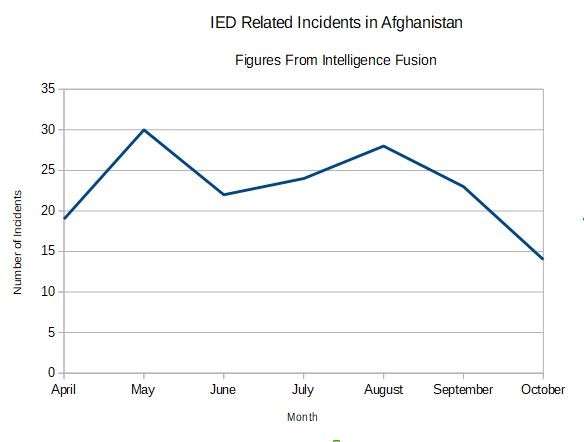
Regardless as to whether the Taliban will actively target the TAPI Pipeline, Afghanistan is still one of the most heavily mined countries in the world. Research conducted by the HALO Trust pointed out that since 1979, 640,00 land mines have been places in Afghanistan. This extensive spread of mines across the country has caused approximately 23,500 casualties.[vi] Therefore, whether being actively targeted or not, staff and assets of the TAPI Pipeline are at significant risk. In general, it is recommended to those travelling Afghanistan to travel by air when possible in order to avoid mine and IED rich areas. The above chart shows that the number of incidents involving IEDâs and mines in Afghanistan remain at a consistently high number, with many other mine and IED related incidents going unreported.
Herat
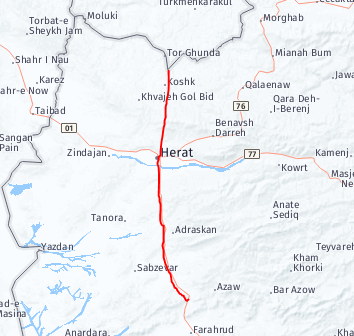
Illustration 1: Proposed route of TAPI through Herat Province.
Whilst security challenges in neighbouring Turkmenistan may have been fairly limited, this is not the case in Afghanistan. The provinces which TAPI intends to traverse (Herat, Farah, Helmand and Kandahar) all contain particularly unstable districts, many of which are controlled or contested by the Taliban. Therefore, the Afghan section of the TAPI pipeline presents perhaps the most significant challenge to the future of the project.
As this analysis views the promises made by the Taliban with scepticism, this section will concentrate on the potential threat posed by the Taliban to the TAPI Pipeline throughout Herat Province.
Notable Security Incidents in Herat
The pipelines initial journey through Herat Province will take the pipeline through a relatively stable area to the north of Herat City, but occasional attacks on security forces are still recorded. However, as the pipeline moves south of Herat City, it must traverse the much less stable Shindand (pictured below) and Adraskan districts, both of which are contested by the Taliban[vii]. In the Shindand district, the Taliban have made determined attempts to seize the district centre, with the most recent attempt being on the 18th of October, 2017 which security forces claimed to have been able to defeat.
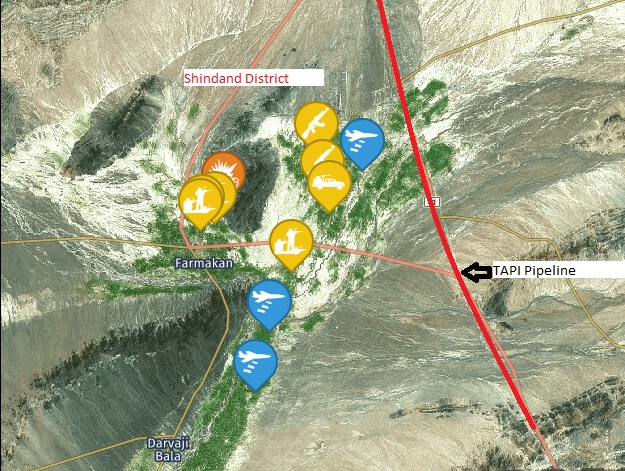
Illustration 2: Security Incidents in the Shindand District, 01/05/17 – 20/11/2017.
Protecting the Pipeline in Herat
If the Taliban choose to disrupt the pipelineâs progress through the Adraskan and Shindand districts they would be well placed to do so. Insecurity characterises these districts from a TAPI Pipeline perspective, and therefore a comprehensive counter-insurgency camapign would be required in these areas in order to provide a modicum of security. The NUG has pledged that approximately 5000-7000 additional personnel will be deployed to protect the route of the TAPI pipeline, but this pledge provides little reassurance. The incidents in the Shindand district, pictured above show that the Taliban are well entrenched in the area and are able to target security forces at will. The quarterly report released by SIGAR in October[viii] also stated that the ANA had decreased by 4000 personnel since the last quarterly report which brings the ANAâs ability to provide 7000 personnel into question. Lastly, Security forces losses have also been severe, with some analysts claiming that the ANSF lost over 1000 personnel in October alone.[ix]
Farah Province
Farah Province is a largely Pashtun Province, (Pashtuns make up 80% of the population of the province) with the primary sub-tribes being the Noorzai, Barakzai and Alizay. As the TAPI Pipeline enters Farah, the security situation along its route deteriorates. Advice from the Foreign Commonwealth Office regarding travel to the area states that all travel to Farah Province is advised against.
Security Challenges in Bala Bulok District
The Bala Bulok district is the first district in the pipelines path as it moves through Farah, and can be seen to the North East of Farah City in the illustration above. The Taliban are largely in control of the district, with security forces presence being hamstrung by a strong Taliban presence. This lack of governmental control is reflected in the incidents recorded by Intelligence Fusion since the 1st of July 2017. Security forces have engaged in multiple fire fights in the area, but most have been inconsequential in relation to control over the district.
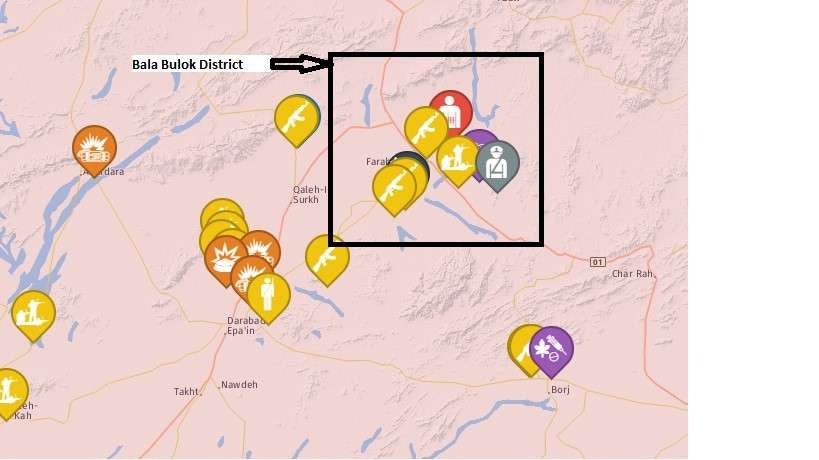
Incidents along the Herat-Kandahar Highway are also common in the Taliban controlled Bala Bulok district. The most notable incident since the 1st of July being when Taliban militants pulled over a civilian bus and killed 7 passengers, taking the rest hostage.[x] The workers who are expected to work on the project will traverse these roads during the construction stage of the project, and without proper security, workers on the project will pose easy targets to IEDâs and Taliban checkpoints.
To the west of the Bala Bulok district is the volatile Farah City, close to the pipelines projected route. Farah City and the surrounding area sees multiple roadside IED attacks targeting security forces vehicles. The Pusht Rod district, to the north of Farah City also sees significant insecurity. FDDâs Long War Journal states that the Pusht Rod district is contested by the Taliban, and has been since 2016. The Security forces hold on the district therefore appears to be tenuous, and isolated security forces positions and patrols are frequently ambushed in the area.
Potential For Dialogue
Farah Province has the potential to present a major security challenge to the TAPI Project, and the difficulties posed have not been addressed by the projects planners. However, there is potential in this district to open some form of dialogue with the dissident Taliban faction led by Mullah Rasool (originally from Farahâs Bakwa district) or other local Taliban commanders. Not only is Rasoolâs splinter group active in the western provinces of Afghanistan, it has also been targeted by Taliban militants loyal to Hebatullah over its protection of water management projects in area. The groups protection of water management projects may point towards a willingness to cooperate with other projects such as TAPI.
Herat and Farah Summary
By utilising date gathered on Intelligence Fusionâs platform, this section of the analysis has come to the conclusion that significant security risks exist in the first two provinces traversed on TAPIâs journey through Afghanistan. The Taliban presence in the area is well established, and there are no guarantees that splinter factions such as those led by Mullah Rasool or the Hebatullah loyalists will allow the project to go ahead. Evidence provided by SIGAR reports regarding the strength and the capability of the ANSF also suggests that coercing the Taliban in these two provinces to stay away from the project is not currently possible. Furthermore, in the time frame given for the project to start constructing the pipeline across Afghanistan, (physical construction expected to begin in approximately two years) it is difficult to see how the ANSF can significantly alter the state of security in such as large hostile area.
[i] https://www.gov.uk/foreign-travel-advice/afghanistan/safety-and-security
[ii] https://thediplomat.com/2016/12/taliban-pledge-to-protect-infrastructure-projects/
[iii] http://pozieresconsulting.com/articles/taliban-threat-to-water-management-projects-in-afghanistan
[iv] https://www.intelligencefusion.co.uk/single-post/2017/07/17/The-Changing-Nature-of-Taliban-Ideology
[v] https://www.voanews.com/a/kabul-skeptical-of-afghan-taliban-vow-protect-new-infrastructure-projects/3617005.html
[vi] http://www.halotrust.org/where-we-work/central-asia/afghanistan/?gclid=CjwKCAiAo9_QBRACEiwASknDwcKX0jy4fRq8CKOjQ6-EeeVtm_kGlpqBMbfuldSdcvMCvEWwJI87LxoCoiIQAvD_BwE
[vii] https://www.longwarjournal.org/mapping-taliban-control-in-afghanistan
[viii] https://www.sigar.mil/pdf/quarterlyreports/2017-10-30qr.pdf
[ix] https://twitter.com/bsarwary/status/924960579118395392
[x] http://www.firstpost.com/world/afghanistan-militants-stop-bus-gun-down-seven-travelers-in-farah-province-3804371.html